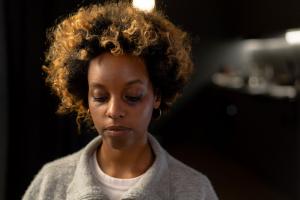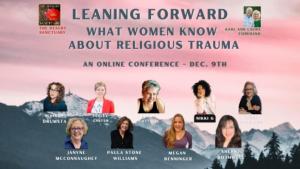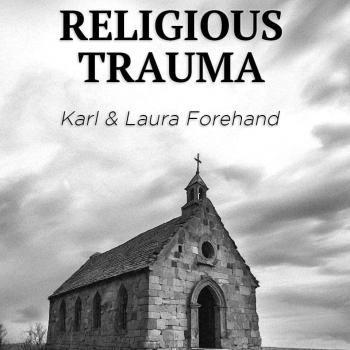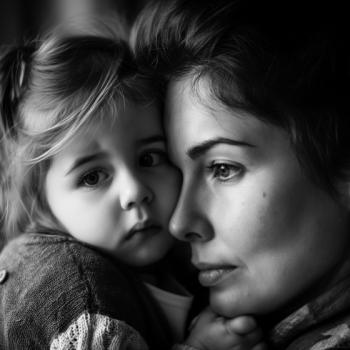Trauma and the Black Community

Nikki G. is a Life Coach and Advanced Certified Trauma Recovery Coach (in training) who helps survivors recover and thrive after Narcissistic Abuse, Religious Trauma, Spiritual Abuse, and cult involvement or High Demand Groups.
Leaning Forward is the title of a book by Karl and Laura Forehand about moving beyond the confines of organized religion. It is also the title of an online conference we have hosted for several years. This year, we decided to host a series of podcasts primarily to help us understand religious trauma and how to move forward. We are also hosting an online conference with the understanding that amplifying women’s voices is probably the most important component.

Preview (video and transcript below)
Video (transcript below)
Transcript
By NikkiG
Leaning Forward Conference: What Women Know about Trauma
I come from a narcissistic family system. Growing up, and being in my family of origin, I did not know what I was in. I just knew there were a lot of traumatic experiences, and I could not put my finger on what was wrong. As I went through my adolescent years, I found myself attracted to a lot of toxic and narcissistic type people. But I still didn’t understand what I had been involved in.
It wasn’t until I found myself further along in my life, after five different cults, that I finally said, “Okay let’s figure out what’s going on, Nikki,” and I started to educate myself and realize how much abuse and toxicity I was around. It caused me to go back and examine the different seasons of my life. I pulled a thread and went back to childhood. I was raised in a somewhat loving, but very religious family. In that upbringing, a lot of my voice and my intuition was squelched. I did not understand the difference between someone who was predatorial, someone who was safe, and someone who could show love. I found myself searching for what I thought would be love but finding the same familiarness that was in my family of origin.
So, after all of that trauma and abuse in the last cult, I said, “Okay, I need to understand what is going on here. That led me on a journey to heal, not only for myself but for my 22-year-old daughter. I was a single mom at the time, and I decided I needed not only to survive but also to thrive for my daughter. I wanted to be there for her and in that desire and that resilience, I found myself understanding and unpacking a lot of accumulated traumas. Even though there were tears and anguish, I was committed to really understanding religious trauma and how cults operate. I began to understand Narcissistic Family Systems for myself and my daughter, but I never imagined that I would find myself doing the work that I am doing now.
About three years ago, I became familiar with a social media platform, during the Pandemic called Clubhouse. It’s a social media app filled with different rooms with different titles. We couldn’t go outside, and we were all quarantined at the time, so I found myself connecting with people who had been through narcissistic abuse. I just started sharing a little bit of my story and started sharing about the spiritual and religious abuse I had been through. People were like, “I’ve been through that–I’ve been through that!” So, I started a clubhouse called “Spiritual Abuse and Cults,” and we unpacked all these themes that I have experienced.
I decided this was something I was supposed to do, so I got some training and then I became a certified trauma recovery coach. Now, I serve clients in the areas of narcissism, religious trauma, and cult involvement and I enjoy educating, speaking, coaching, and empowering them to know that there is hope after experiencing religious trauma. I also help them understand that they can move forward with their lives. The healing process may be a little tedious and take some time, but that is okay, and they can find happiness even though they have been through some horrific things.
My heart started to ache for the black community. I realized there were not a lot of resources available for those in the black community concerning religious trauma, so earlier this year, a couple of my colleagues and I started a podcast called Surviving the Black Church. We finished season One. Season two will be here next year, but we also started another work that is literally brand new, and it’s called a Black Religious Trauma Recovery Network. This will be another extension of the podcast where we will be servicing resourcing and supporting those in the black community who have been through some of these horrific experiences, such as myself, and don’t know where to go or feel like they don’t fit in non-black supportive communities. I also am chair of the board of directors for Tears of Eden, which is an organization to support those who’ve been through spiritual abuse in the Evangelical community.
What is Trauma?
Religious trauma is psychological and emotional distress that results from harmful traumatic experiences, beliefs, teachings, expressions of faith, and practices within the church. I think that’s the key thing that a lot of people forget that it is physiological. Some people refer to religious trauma as Church hurt. So, they respond, “Oh you got hurt a little bit, oh just pray a little bit more and have a little bit more faith. You just maybe need to fast and pray and you’ll be okay.” Those are the things that people offer that those who don’t know offer those options, but they don’t realize it is physiological. The trauma is in the body, and I’m not you know putting anyone down that offers those resources, but we still have to work it out in your body. We still have to connect with ourselves.
Trauma is coined as The Great Disconnector. I don’t just service the black community I serve humanity as much as I can when comes to recovery. But in particular, when it comes to the black community, it is so important because the church has played such a significant role in our community. According to Pew Research, eight out of 10 black Americans in this country, identify as Christian. That’s a big number. If eight out of 10 identify as Christian, let’s assume within that eight, there were three or four that experienced religious trauma and they’re looking for resources they may not be able to find. They may be looking for resources within the black community and often time they don’t find that it’s extremely important to start to have conversations about how this trauma is impacting us, and how we as a community can be resourced.
The History
Historically, and I don’t know if a lot of people are aware of this, when black people were brought to America and were enslaved, Christianity was given in exchange for whatever form of spirituality they had before. They were removed from their forms of spirituality and now given Christianity and it was also used as a tool to keep blacks submissive and obedient. It created this mentality that God does not care about us. It created this mentality that he cares about those who are oppressing us, but what about us?
Historically, some of our roots cause us to have to unpack it as we unpack religious trauma. We can’t just stop at what happened in our specific church. Sometimes we have to go to our family generational line and even back to start to uncover a lot of these intersectional ties. During times of the past, during slavery and Jim Crow, many black people learned how to read, and many learned how to read through the Bible. That was the first book that they used to learn how to read, so the root system is so deep if that same Bible taught great, great, great, great, grandma how to read, and now someone has been in a church where that same Bible was used as a weapon to abuse. It is very conflicting, and it can often cause cognitive dissonance for an individual and a survivor.
Christianity has influenced the black community. You hear gospel music come out and even a lot of R&B and secular music has come out of and has its origin in the black church. Generationally it’s not just okay to just change. Let’s just say I am using myself as an example. Okay, Nikki can’t go back to church anymore cuz she’s just been (you heard my story} she’s been just so traumatized. Well, how does my grandmother look at that? How does my great-grandfather look at that? How can I even coexist with them if they know that this is what I feel is safe for me now? So, the generational ties can cause many to feel like they can’t start to deconstruct or navigate through the religious trauma.
Then there’s a lack of education and awareness so these are some of the reasons why it is very important to have these discussions. I am so appreciative of this platform and for Karl and Laura Forehand who hosted the conference and this book which facilitates this type of conversation to be had. Because the more we understand each other, the more empathy we can have for one another and the more we can support one another.
Some of these may seem similar to any person who has experienced religious trauma and there are similarities. There are a lot of similarities culturally, but it just looks different, and the weight of pain and anguish just looks different. Guilt and shame affect many people who are religious trauma survivors. Cult survivors feel that, but in the black community, individuals feel guilt and shame related to no longer being able to consume religious teachings anymore or attend church the way that their loved ones were doing. They feel so disconnected from God and then they feel ashamed to be around their friends who are still “on fire” for God and they’re not on fire anymore.
They’re trying to grapple with what happened, why it happened, and what’s wrong with me. I can’t connect with my old friends anymore. This music, and these teachings are so embedded in my whole cultural identity. For me to pull away from this is to pull away from a part of my blackness.
Navigating Complexities
So how do navigate between these complexities? Often, religious survivors will go back because they can’t imagine sustaining themselves outside of the fold. After all, it just has too many intersectionalities.
One of these is social isolation. In the black community, survivors feel they’re going to be ridiculed, judged, and labeled. Critics might say, “Oh, she fell away from God” or “she’s not walking with God anymore.” It’s almost as if we feel like we have spiritual leprosy and now the cousin doesn’t want to come around anymore or if they do come around, they’re very vocal and very judgmental. They pull out their scripture gun and they’re ready to shoot it at us because we can’t find safety in the church anymore (or in that particular faith). Anymore.
People also say things such as “You should just forgive and God will do the rest, so just come on back.” There are a lot of scriptural references that we hear, and it impedes one’s physical, mental, and emotional stability. We hear things in the black community like, “You don’t give the devil any room to take you away from God. You’ve been out of church too long, baby come on back. It’s all right. Come on back. God’s going to protect you. You know there is safety in the house of God. Outside of his house, you are exposed, and potentially the enemy can potentially take over.”
These types of things are so invalidating. It almost retraumatizes the survivor, but this is so typical in the black community. The forgiveness piece is a big part of it. They say, “You want to hear from God. You want God to forgive you, you need to forgive your abusers. That’s probably just a little offense. Turn the other cheek.” Other ethnicities may hear the same thing, but the impact and the weight are even harder for us. Anxiety, flashbacks, and depression are common.
The doctrine of hell is preached a lot in the black community, more so than in other communities. I don’t have any stats on that, but in most black churches the doctrine of hell is in the fabric of everything, and it sometimes can be used as a mechanism of controlling behavior. They might say. “Well, if you don’t do what the pastor asks, you know hell is around the corner. If you don’t tithe enough if you don’t give enough, if you don’t serve enough.” Suggestions to volunteer can easily be intertwined with these admonitions.
Because of this messaging, when people leave the fold for safety, even though a lot of survivors don’t want to leave, feel like they have no choice. The abuse has been insurmountable, and they need to be safe. But when they leave, they have reoccurring nightmares about going to go to hell. They think, “If I am out too long from church…” Fear and depression can overtake them. It can become really hard for them to maintain any type of emotional or physical health.
They often experience a loss of trust for themselves, God, others, and religious institutions. They often suffer a loss of their identity. They think to themselves:
“Who am I?”
“I used to be the warrior in church.”
“I used to be the prophetic voice.”
“I used to be a dream interpreter.”
“I ran a children’s church. What about those little kids? I’m not there anymore.”
“What are they going to think?”
“Who am I outside of these labels?”
“I don’t know anymore.”
These types of thoughts pounce on us as we’re trying to navigate. And then, we have to work. We have a family. We have a spouse perhaps. It’s just a lot to navigate.
Mental Health Stigmas and Challenges
Even in the leadership, many don’t trust the mental health community. Many feel that if you need to go to any mental health professional, that is an indictment against God’s power and his ability to heal you. If you feel depressed, then that is the enemy in his thoughts trying to come and take over your mind. They assume that all you have to do is put on the mind of Christ and they don’t understand that, for some, especially after religious trauma, there’s so much shame on you and it’s more complicated and nuanced than that.
Mental health issues are complicated. Maybe it’s generalized anxiety. Maybe it’s unspecified depression. Maybe it’s religious scrupulosity, which is religious OCD where you just fear that you are going to sin and disappoint God all the time. Then it becomes obsessive-compulsive that there’s so much shame on you and so when someone’s dealing with something severe, praying it away, fasting it away, or reading the Bible from cover to cover may not be sufficient.
So, in the black community, that is deemed a last resort, if it even is a resort at all. The remedy is to come to the altar, let the leaders apply oil upon you, let’s pray the demon off, which sounds crazy, but I’m just being honest. There’s a lot of that so you have a lot of young people who are starting to make sense of what’s happening in a lot of churches. They’re like, “Hey Mom and Dad, I’m having these thoughts. I’m having these emotions. I would like to see a mental health professional.” And the parents are like, “That’s a lie from the pit of Hell. You need to come back to church. I’ll tell the pastor and he’s going to come and lay hands on you. You’ll be all right”. This is very typical of the black community because it goes back to slavery.
All we knew was God got us out of slavery, and he will get us out of whatever happens now, even if we still feel afflicted and there are so many systemic, traumatic things that happen to us as a people. If God can’t do it, it’s not going to be done. I’m not saying that’s wrong, but the likelihood of being open to other resources is very hard, especially for the older generation.
Access to Resources
Again, limited access to resources. If we have that stigma, and eight out of 10 black Americans identify as Christian, I can’t assume that eight are all against Mental Health Resources, but what is available to help those who are hurting mentally and psychologically? In our community, we don’t have conferences like this. Not yet. We don’t have a lot of mental health therapists who are experts in this field within the mental health community. Only 4 to 5% of these experts are black Americans, so if black Americans or the black community feels safer with someone who looks like them, they only have four to five out of every one hundred therapists.
That is extremely hard because our resources are limited, but I often encourage people I connect with survivors, to not limit themselves to just what is in the black community. There are so many resources out there available that are helpful. I know that some may not ever be able to make that jump. But for me, because I was so desperate and I wanted it to get better, I’m like “I don’t care what they look like!” If they’re a frog. If it’s Elmo. I said, “Do you have resources for me? That helped me to meet a lot of amazing human beings on this planet that I cherish to this day, who I work with to this day.
So, my heart is to bring some of those resources into my community, especially for the ones who would never venture out. Resources and even research is very limited on what religious trauma looks like in our community. We’re included a little, bit but there’s not a lot of data.
Family Dynamics
Family Dynamics is another challenge. Like I said earlier if you live in a household where everybody’s religious, but you’ve been through abuse and trauma, it is very hard to coexist in that environment. You hear worship music played in the house and the car. You hear prayer and intercession throughout the house, and for some survivors, that may be triggering. Balancing spirituality. Balancing that I have a relationship with God and I have my faith, but I need to be healed too so I can’t go to the church right now because it doesn’t feel safe. But I feel isolated and alone. I want to connect with God, but I don’t know if he loves me anymore.
After what I’ve been through, cognitive dissonance can be so overwhelming for many in the black community who are navigating through this.
Beginning to Heal
Some of my advice is similar to what I would say to any religious trauma survivor. First, be compassionate and kind to yourself. What you experienced is not your fault.” For many of us, we just wanted to love God and we wanted to know more about God. We wanted to love people. We wanted to be of service and then this happened. And then, the Scriptures were manipulated and taught to us. Our behavior was controlled, our emotions were controlled, and some of us were shunned and embarrassed. We went through all these things and asked, “Why me?” It’s not your fault. Please understand that is most important!
Then, I would encourage people, as you are able, and as your nervous system allows you, to educate yourself. It is so important to understand what you experience. The more I started to learn on my own, the more I started to realize this wasn’t my fault. I realized this is something that I did not understand, but this is something I can work through to be healed. So, I read the books, and I went on YouTube and watched a lot of people in the church and outside of the church who were speaking about it. During that time, it was very limited. I went to therapy, although my therapist did not know about religious trauma cults or spiritual abuse at that time. When I came out of my last cult, my CPTSD was so acute, that I needed to be in front of a therapist, but once it became more stable, I was able to continue to educate myself even though some of the therapists I connected with did not have that expertise.
In my mind, I determined, “This will not Define the rest of my life. I have so much more to love, to learn, to give! I may not know the path forward, but there are still more chapters in my life yet to be written. I’m going to be patient with myself. I’m going to learn what I can and I’m going to try to apply it.”
I would encourage people to educate themselves and social media can be not good, but it can be helpful and good.
I would tell people to be wise but listen to other survivor’s stories. It will validate you. It will encourage you. It will let you know you’re not alone. If someone else can hear the strength of that survivor, it can help encourage you and lift your spirits.
I would also encourage people to connect with black mental health organizations like The Association of Black Psychologists, and The Black Mental Health Alliance. My colleagues and I have just begun The Black Religious Trauma Recovery Network. We are offering twice-a-month events online where people can come. All are welcome, but it is particularly for the black community. If you’re non-black, and you have a heart for the black community and you want to learn, you are welcome. If you’re a mental health professional and you want to learn how you can resource your clients, you are welcome. We have different topics and host these events twice a month. We will be able to give that as a resource to the community for those who want to know.
I also recommend healing circles and support groups. Black people are very tribal. We love Gathering. We love the energy, the resilience, and the strength that we get when we gather. Even sometimes, when it becomes dysfunctional, there’s just something about when we gather. So, there are healing circles where we’re able to be our brother’s keeper, or our sister’s keeper, to encourage one another and be vulnerable.
I remember this one survivor said, “Nikki where are the support groups for us?” Our network is working on that to perhaps be able to offer that soon. We want to offer a space where we can speak our language and refer to our cultural references. We can be resourced and encourage storytelling since we as a people are very demonstrative. We love to tell stories, which can be seen even in the way black preachers preach. We are very into taking the text, breaking it down, and telling it in such a compelling way. This can be helpful and can be manipulative as well.
But there is power when we all tell and share our stories. We receive more when we hear stories than a lot of information.
Awareness and Sensitivity to Unique Challenges
I’m encouraging survivors to educate themselves. I’m also encouraging organizations and individuals to educate themselves. I know there are not a lot of statistics. Pew Research has been doing um a phenomenal job at least starting that process. I encourage people to look at the stats. Eight out of 10 black Americans identify as Christians. So how many of those eight are going through religious trauma right now? If you are an organization, what can you do to create resources that will be able to service those, particularly the church? If you are an individual, you may not have been through a religious trauma, but that doesn’t mean your friend and her experiences are not real or your brother and his experiences are not real.
I want to encourage you to be with the Survivors where they are if you are able. Some are not. I know that may sound harsh but some, because of where they are spiritually, may look at a person who’s going through that as “I can’t touch you right now. You are questioning things that I’m choosing not to question. I’m just being obedient, and you are walking through a process that I am unfamiliar with. I love you, but I can’t connect with you right now.”
I want to encourage people like that and others that religious trauma is real. It is very debilitating, and what a lot of survivors want the most when we’re going through that, is people that will hold our hand, people that won’t judge us. We want people to say, “I’m sorry this happened to you. I hear you. I believe you. How can I support you?”
If the survivor says, “Hey, can you not quote scriptures at me every time I try to talk?” Listen to them! You may feel like if you are quoting scriptures to them, then they will snap out of it. But it’s nothing to snap out of. This is real—It’s not in their head. They didn’t imagine it. The trauma is in their body. Take them out for coffee. give them a card, or a gift certificate to get a massage. Text them now and then and say “Hey, you’re not alone. I don’t understand everything but I’m not going anywhere.”
If you don’t understand, start googling. There are resources even more so now than when I first went through. Gain an understanding of cults and experience things that show empathy,
Organizations, you have the resources. You have the money and the power. Connect with Ministries groups and organizations that are already doing the work, so you don’t have to reinvent the wheel. Come alongside organizations and speakers like we had at The Leaning Forward Conference. Find out what they’re doing and say, “How can I support you? What do you need to help what you’re doing spread?” Support others. It doesn’t have to be complicated. The key ingredient is empathy and even though many may not understand this complexity called religious trauma, it matters that you care. If you care, on a human level no matter what color, no matter where they’re from, how they speak, if you can hear what a survivor goes through while they’re enduring the abuse and even after, you will want to help, you will want to serve, and you will want to resource them.
For churches specifically, diverse leadership is so important. For us, when we see someone that looks like us, it just creates such a level of safety. Now that doesn’t mean that that person is safe. We’re not a monolith. We don’t all think alike but, for us in our body, the likelihood is that person will understand my experience and I don’t have to spend so much time explaining the cultural differences. I can just start right from experience, “The pastor told me that if I don’t come back for the third service, I couldn’t come back to the church anymore.” You want to be able to share that and the other person says, “I know someone that went through that too.”
Having black people on leadership, and black people in the mental health field for those churches that have joined arms with mental health professionals pays dividends. Having those who are qualified, those who have experienced this, those who are resourced, come alongside, and let’s bring them on staff. Let’s get them on your boards. Let’s get them as part of the conferences that you do. It is so important for black Americans who’ve experienced religious trauma to see faces like them. Let’s get some training within the churches. Let’s get some culturally competent training that’s trauma-informed, trauma-responsive, with diversity if possible.
Bring it into the church, since if the church wants to be the light and the salt of the world, then we have to be able to resource it as well. This is a problem, whether the church wants to admit it or not, and many survivors are looking. Because, on one hand, people want to judge people who say they can’t do the church anymore. But on the other hand, how can you judge if you have not created resources for those to remain in the church and be assisted? So, if you care about this issue that is plaguing many churches, I encourage leaders to find resources and people, to get that training, and lock arms with organizations that are already doing that. Have support groups for people who are experiencing this.
I know that may seem scary but I want to talk to the leaders who say listen I’m not a perfect Pastor I’m not a perfect leader but I care I don’t like to see people outside of the church spiritually bleeding out because of what happened at some other place at some other church I want to be a help and a resource so those that have that that means when you have support groups when you begin to bring this to your churches and talk about it there’s going to be some stuff that people don’t want to hear but how can people heal if they don’t acknowledge what has happened
This is becoming and has become a cancer, so to speak, within the churches. We need training, we need support groups, and we need open dialogue. When survivors come forward, they should not be judged, or shamed. They are not considered whistleblowers and they’re not considered people who complain a lot. They are considered human, and they have been through some really tough things.
A Message to Men
Thank you for taking the time to listen to us, and to what we have to say as women. We are powerful beings. We have so much to say. We’re intuitive. We see, we understand, and we have a voice. I’m not saying this in a competitive sense between men or women, I’m just saying we matter! We matter in the church, we matter in the home, and outside of the church and home.
These things that we’ve been talking about are important for the typical American Church, and Black, White, Korean, Hispanic, etc. Mostly men are at the helm of churches. So this is for those who have an empathetic heart. I refuse to believe that every male leader or Pastor, Bishop or Apostle, whatever label you carry, is not empathetic and turning a blind eye. I know there are some out here, like Karl Forehand, who care and who are saying “Enough is enough!” They are saying, “It’s time we bring the women forward. It’s time that we hear them.”
For men in the pews in the church, who are not necessarily leaders, but they bring their wives and their daughters and their children to church, it’s time for self-reflection! You may say, “That’s not me, I haven’t done anything like that, so what do I have to worry about.” But your brother two pews behind you might be engaging in some of this behavior. You know, religious trauma is not just leader to congregant, religious trauma can take place right in a marriage. You can have a husband who uses Scriptures to control and “lord” over their wife and silence her so she cannot hear.
So, this is a time for all men, whether this is something that you have partaken of or not, to reflect, to understand your own biases, to understand your privileges, and your preoccupations with different things where you’ve learned, such as the man is the leader everywhere. Does that mean women don’t have a place and they don’t have a voice? I don’t think that that’s true. We have something to say! An open conversation like this Leaning Forward conference.
We have to keep having these conversations until the conversations go beyond just online but in the pews, during Bible study time, outside in the children’s church, where you’re raising your children not to be male-dominant or part of a patriarchal system. But you’re raising you’re your sons to honor the women and prefer them when they have something to say that is healing and of importance and wise for situations.
Be an ally. Like I said, there may be some that say “I’ve never taken part of that and my heart grieves when I get with another brother that feels the same way, and then get with another brother that feels the same way,” And then you form a male’s group and say how can we start tearing down this patriarchal system and allow the women to come forward. Religious trauma is not just for women. It’s also male, but statistically, women are the ones who are enduring religious trauma more than the males. So what are we going to do about that statistic? We have to understand the research, acknowledge what has happened, and remove the shame so that we can start moving forward toward solutions, healing, and recovery.
We want to challenge stereotypes. What Grandpa and great, great, grandpa used to do and the way they used to pastor the church, or the way they used to lead the men’s group and the men’s choir, is not especially the way we have to. If you are aware you have four or five daughters right in your house and you don’t want them to be under that same weight that you grew up under, challenge the stereotypes! Challenge the status quo! Then mentor this next generation and even mentor your peers.
So, for the leaders, you can apply all of those things and then lead by example. You can be a catalyst for change. Unfortunately, I can’t say that religious abuse spiritual abuse, and cults are going anywhere. We live in a world where there’s both dark and light. We live in a world where some people are not satisfied with just supporting and empowering people. Some people, for a whole lot of reasons, actually are power hungry, they want to control, manipulate, and dominate.
So, this problem is going to be around, so how do we start creating a shift?
It’s going to take the men in leadership to lead by example to say, “You know what, Sister so and so, she has a message of healing and hope. I’m not preaching this Sunday. I’m going to allow her to come up here and she’s going to speak to the congregation. “Then, maybe next month, I’m going to start doing a women’s thing where every month one woman gets to come up and start.” It may start out slow, but that’s okay, start leading by example. Promote inclusive leadership practices that actively involve women.
And then in the black community, black folks who have a voice and have something to say should elevate this. Allow mental health professionals to shut set up shop on a Saturday and have training for people in the church who want to know more.
it is possible for those who have a connection with God and their faith to maintain that faith and to get the help and the resources they need in a mental health capacity. The key question for the leaders is, “Is that what you want? Do you want that, because doing things like this that I’m suggesting will require something of us?” It’s not for everybody. for you to remove some of the holds.
I know a lot of leaders who revel in the fact that their members are easily controlled. For you to allow black voices to be heard, women’s voices to be heard, and little girl’s voices to be heard. You are going to have to honor people on a human level and realize that they don’t belong to you. They belong to their creator and so if that is your heart, then some of these things I’m talking about won’t be so hard to do. But, if inside of you, you’re still wrestling with the power dynamics, you’re still wrestling with the patriarchal messages that have been indoctrinated in you from five to six Generations back, it may be almost impossible.
I’m not judging you, but I implore you to work through that. I implore you to acknowledge that, I implore you to start to heal from that so that you can lead people in a way that is honoring, empowering, and not controlling, dominating, and abusive.
So, for the males, we appreciate you, we need you, but you need us too!
 About Karl Forehand
About Karl Forehand












